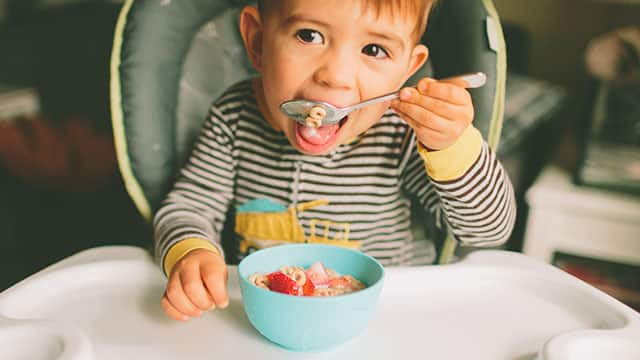Is Your Child Ready for Solid Foods?
Generally speaking, babies are usually ready to try their first solid foods at around six months of age. By this time, your baby’s digestive system should have developed enough to cope with solid foods, and they should be physically able to sit up and maneuver their food safely.
Look out for these signs that indicate your baby is ready to safely make the switch to solid foods:
- They’re able to sit up without help and support their own head.
- They can grasp or manipulate small objects with their hands and bring them towards their mouth.
- They readily swallow food without pushing it back out.
If you’re not sure whether it’s time for your baby’s first solid food, your family physician or pediatrician is a helpful resource. Be sure to book an appointment or give them a call if you have any questions, doubts or concerns about weaning.
Foods to Avoid
Before we talk about what foods to start baby on, let’s talk about the foods to avoid! This is super important because your child’s immune system is still developing, and they’re still sensitive to some pathogens that are safe for older children and adults.
Foods and drinks to avoid giving your infant include:
- Honey (both cooked and uncooked).
- Unpasteurized items (such as unpasteurized juice or dairy products).
- Raw or unwashed fruits and vegetables (be sure to cook and wash them first).
Of course, it’s also important to avoid items that pose a choking hazard, such as grapes, nuts, and large chunks of food.
When it comes to baby-friendly food, it’s best to avoid overly sugary or acidic items that could contribute to dental problems. Skip out on overly salty items as well. According to MyPlate, food preferences can be established during this phase of your child’s life, so steering them away from salt can help protect them from overconsumption later on.
The Best First Solid Foods for Baby
Luckily, the preferences you help your child build now could set them up for success through childhood and into adulthood. A good rule of thumb to keep in mind is that foods you feed your infant should be rich in nutrients, especially iron and zinc. To set your child up for dietary success, choose a variety of foods that introduce your infant to all types of flavors and textures.
It’s a smart idea to supervise your child while they eat and monitor them for potential allergic reactions. According to MyPlate, introducing potential allergens (like soy and tree nuts) simultaneously with other foods may reduce their likelihood of developing an allergy.
Keep reading below, and we’ll outline some top choices for baby’s first solid food.
Baby Cereal
This variety of cereal helps start your child on solid foods as it’s not too flavorful, is easy to portion into smaller bites, and can be served easily with a spoon. You can thin and soften the food using formula or breastmilk to varying degrees based on how they tolerate it.
Fruits and Vegetables
These are not only packed with nutrients but great for your child’s teeth. While these are great first solid foods for babies, be sure to wash them thoroughly to remove bacteria and other pathogens. It's best to start with fruits and veggies that are cooked, pureed, or mashed to ensure you can appropriately alter the size of their bites. Keep in mind that you should avoid large pieces, whole grapes, and other fruits and veggies that could pose a choking hazard.
Dairy Products
Dairy items like milk, yogurt, and cheese are ideal for first foods (assuming they’re pasteurized, as mentioned above). They contain high calcium and vitamin D levels, are soft, and easy to serve in bite-size portions.
Table Foods
After your little tike has become accustomed to the basic starting foods, they may be ready to advance to table foods. Examples of these include raw (but washed) pieces of fruits or veggies, like celery or apple. Another sign to watch out for is that their first teeth have erupted, which usually occurs around six months of age.
If you ever get overwhelmed, remember that your dental or medical professional is a great resource when it comes to navigating healthy food choices for your child. Avoiding overly sugary foods and emphasizing a varied, nutrient-rich diet will help mold their preferences and set them up for long-term dental success.
Frequently Asked Questions About Baby’s First Foods
What baby food should I introduce first?
Baby’s first foods should be soft and easy for them to eat. Start by introducing your baby to baby cereals, dairy products, and washed, pureed fruits and vegetables. Avoid harder foods, larger foods, honey, and anything unwashed or unpasteurized.
What are the best first foods to introduce to my baby?
Try starting your baby off with:
- Milk.
- Yogurt.
- Soft, pasteurized cheese.
- Baby cereal.
- Cooked, pureed or mashed fruits and vegetables.
- Soft fruits like bananas.
As they get used to solid foods, you can introduce raw (but washed) crunchy fruits and vegetables like apple, celery and carrot sticks.
How do I transition my baby from breastmilk or formula to solid foods?
Try mixing some breastmilk or formula with baby cereal at first to help your baby make the transition. Go slowly and offer them only one or two things at a time to try so that they’re not overwhelmed by the new tastes and textures. And remember to give your baby lots of encouragement and praise as they get to grips with new skills like grasping and chewing.
What should I do if my baby refuses to eat certain solid foods?
Some days, your baby might want to try every food in sight, while other days all they want is a bottle. This is normal. Try not to make a fuss or push the foods on your baby, as this can cause negative associations with food and mealtimes. Instead, simply take the food away without fanfare and offer something else, and then offer the food again at another time when both you and your baby are happy and relaxed. It can take up to 10 times for a baby to take to a new food, so patience is key!
Oral Care Center articles are reviewed by an oral health medical professional. This information is for educational purposes only. This content is not intended to be a substitute for professional medical advice, diagnosis or treatment. Always seek the advice of your dentist, physician or other qualified healthcare provider.
ORAL HEALTH QUIZ
What's behind your smile?
Take our Oral Health assessment to get the most from your oral care routine
ORAL HEALTH QUIZ
What's behind your smile?
Take our Oral Health assessment to get the most from your oral care routine
Join Us
Get the best of your oral health routine and take it to the next level with expert advice, recommendations, products and solutions and special offers.
Join Us
Get the best of your oral health routine and take it to the next level with expert advice, recommendations, products and solutions and special offers.















